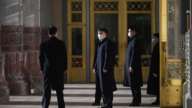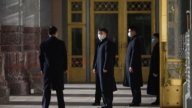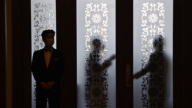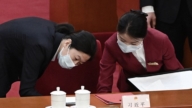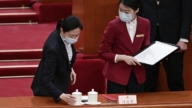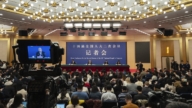【新唐人2013年03月18日訊】3月16號,中共的人大投票,表決了政府組成人員名單。這份名單由新任的總理李克強提交。而其中,環保部部長周生賢得到最低票數。在投票表決環境與資源保護委員會主委相關名單時,更是出現罕見景象。有超過3成的代表,對這份名單草案投下反對和棄權票。這是否是民意的反映呢?一起來聽聽專家的評論分析。
李克強向大會提交的表決名單包括4名副總理, 5名國務委員和25名部級領導人的人選。
大會公布的表決結果顯示,一共有4人得票低於2800張,分別是環境保護部部長周生賢,住房和城鄉建設部長姜偉新,中國人民銀行行長周小川,和教育部部長袁貴仁。他們被網民諷刺為四大「反對票票王」部長。
其中,得票最低的環境保護部部長周生賢,只得到2734張贊成票,反對和棄權票達到171票和47票。
這次人大會議召開前夕,中國各大城市的霧霾天氣成為無法逃避的話題。而會議過程中,通過河流向上海漂去的數近萬頭死豬,更激起了民眾的憤怒。
有分析認為,被稱為「橡皮圖章」的人大,向周生賢投出如此大量的反對票和棄權票,是目前中國大陸環境污染狀況不斷惡化和升級的直接結果。
時事評論員司馬泰:「能夠投反對票這本身是個好現象。但是如果共產黨通過這種方式來玩這種所謂的黨內民主,來應付外界的對中共政治民主化制度的一種拖延,敷衍和搪塞:我們先搞黨內民主。是非常危險的。因為它這種黨內民主就是黨內政治鬥爭,變成了一個黨內集團利益的工具。」
會議在表決環境與資源保護委員會主任委員、副主任委員、和委員等名單草案時,更出現850反對票,125棄權票,另有15人未按表決器的罕見景象。草案最終以1969票贊成,勉強通過。超過3成代表反對和棄權。當會場大屏幕顯示這樣的結果時,引發臺下一陣轟動。
時事評論員任百鳴:「實際上他也知道環境保護也不光是環保部門說了算的,往往都是當地的這些官員,他們從實際的利益出發,進行環境和各個方面的破壞。但是這些代表們就借這個機會,發洩這樣的不滿。實際上這個跟民主還差的很遠,因為裡面很多東西都是事先擬定的。」
時事評論員任百鳴還指出,大量反對票出現的一個實質原因是:目前中共沒有一個絕對的權力核心人物,黨內分化明顯。
任百鳴:「它當然不可能反映出民意,因為中共一黨專制是一個根本的東西,它從來也不會改變。它只不過就是在目前的這種政壇的亂象、權力的內鬥,以及現在社會上各種,很多很危急的因素,紛紛表露出來以後,所以各種各樣的聲音就迫不得已的發出來。所以是內外結合和社會動盪的一種反映。」
在此之前,李源潮當選為中共國家副主席,但反對及棄權票多達80張和37張。中共中央統戰部長令計劃在選舉新一屆政協副主席時,也得到了90張反對票和22張棄權票。
台灣《中央社》報導認為,這些派系特徵明顯的領導人,獲得高反對票和棄權票,顯示出表面和諧的中共政壇,在檯面下的權力鬥爭,從來沒有平息過。
採訪/常春 編輯/李明飛 後製/蕭宇
30% of Representatives Vote Against the Environmental Protection Committee
On March 16, the Party’s National Congress voted on
the members of China’s government.
The candidate name list was turned in by Li Keqiang.
Among all candidates, Zhou Shengxian,
Minister of the Department of Environmental Protection,
was the bottom candidate.
It was rare to see 30% of representatives cast dissenting
votes or abstention votes for the members of Environment and Resources Protection Committee.
Is this phenomenon the reflection of public opinion?
Li Keqiang turned in a candidate list for 4 Vice Premiers,
5 State Council members and 25 Ministers.
Based on voting results, 4 candidates got
less than 2,800 votes.
They are Zhou Shengxian, Minister of the
Department of Environmental Protection;
Jiang Weixin, Minister of the Department of Housing
and Municipal and Rural Construction;
Zhou Xiaochuan, Governor of People’s Bank of China and
Yuan Guiren, Minister of Department of Education.
The bottom candidate is Zhou Shengxian, Minister of
the Department of Environment Protection.
Zhou got 2,734 consenting votes,
171 dissenting votes, and 47 abstention votes.
Right before the 18th National Congress, severely polluted
air of big cities in China became an unavoidable topic.
The National Congress has been called a “rubber stamp"congress.
However, this time Zhou Shengxian got this many dissenting votes.
Some analysts think that it reflects the fact that
environmental pollution in China has become severe.
Commentator Sima Tai:"It’s a good sign that
dissenting votes are allowed.
Nevertheless, if the Party tries to play internal democracy
to procrastinate the realization of democratization in China, this will be dangerous.
The party’s internal democracy is nothing but a tool that
factions use to enhance their own interest."
In the voting for Director, Associate Director and board
members of the Environment and Resources Protection Committee,
there were 850 dissenting votes and 125 abstention votes.
15 people didn’t push any button for their votes. In the end,
the draft was barely passed with 1,969 consent votes.
Over 30% of representatives were against the draft or
waived their voting right.
Commentator Ren Baiming:"As a matter of fact,
everyone knows that protection is not only up to the Department of Environmental Protection.
Most of the time, it is down to those local officials who
themselves caused the deterioration of the environment in pursuit of their own benefits.
The congress representatives were only taking the chance
to show their dissatisfaction, which is in no way related to democracy.
In fact, a lot of things that happened in the congress
were predetermined."
Ren Baiming also stated another reason for
the many dissenting votes.
That is, the Party doesn’t have a core leader with
absolute power, so the Party is as if disintegrated.
Ren Baiming: “The voting cannot demonstrate
any public opinion at all.
The Chinese Communist Party is a one-party dictatorship
and this fact has never changed.
Nowadays, due to political chaos, faction conflicts and
various social problems and perils, all kind of voices for different issues are made.
Therefore, discontent opinions are not a demonstration of
democracy, but of social turbulence."
Earlier, When Li Yuanchao was elected Vice Chairman,
he got 80 dissenting votes and 37 abstention votes.
When Ling Jihua was elected as Vice Chairman of Political Bureau,
he got 90 dissenting votes and 22 abstention votes.
Taiwan’s “Central New Agency"stated that it only superficially
shows political harmony when some leaders got many dissenting and abstention votes.
However, the faction conflicts behind the scenes
have never stopped.
‘



